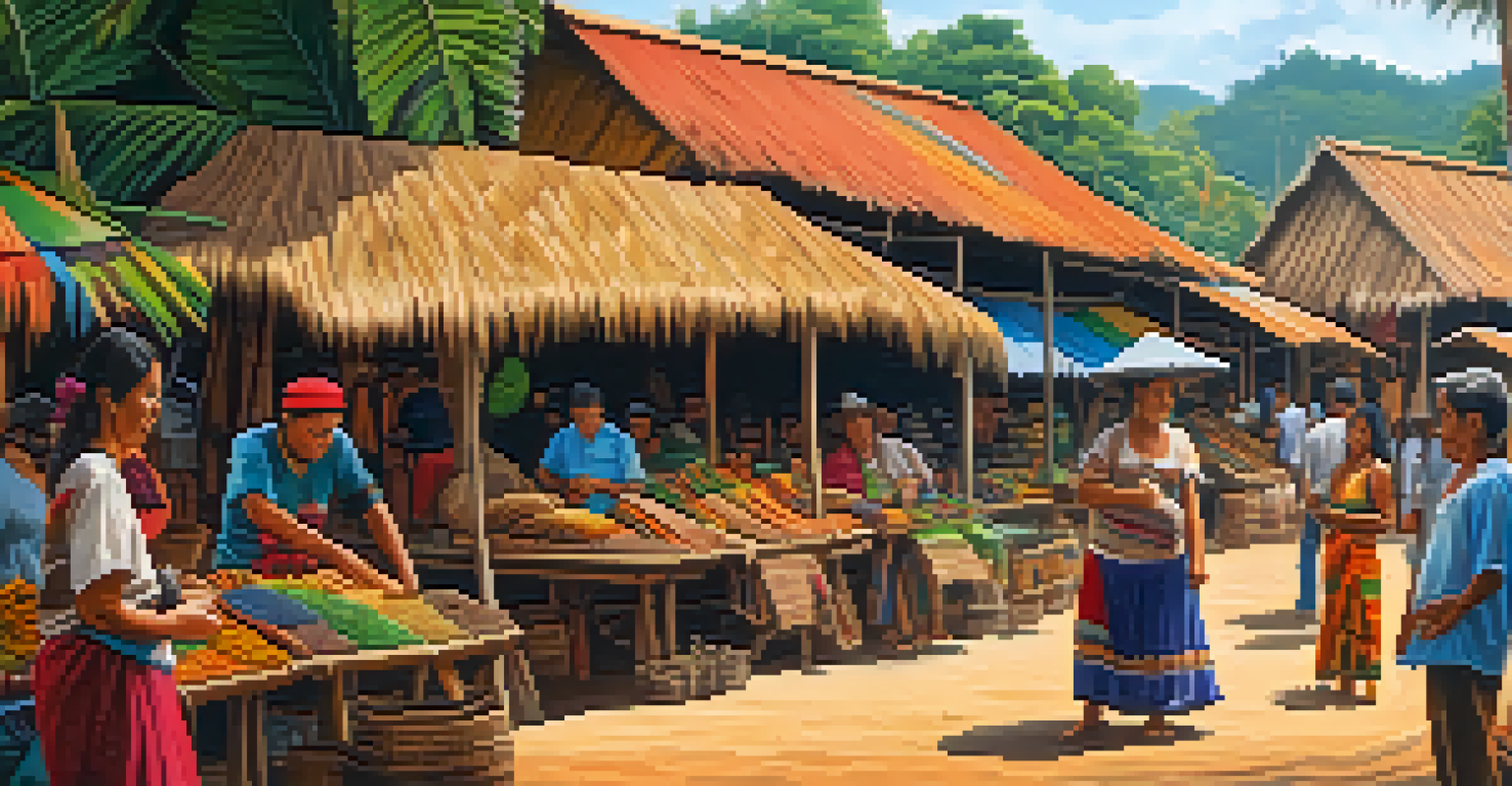The Impact of Ayahuasca Tourism on Local Ecosystems

Understanding Ayahuasca Tourism and Its Appeal
Ayahuasca tourism is a growing phenomenon where individuals travel to the Amazon to participate in traditional ceremonies involving the Ayahuasca brew. This experience is often sought for spiritual growth, healing, or personal transformation. The allure of connecting with indigenous cultures and nature draws many to these remote areas.
Traveling is not just about the destination; it's about the journey and the impact we leave behind.
However, the rise in visitor numbers can strain local resources and ecosystems. As more tourists flock to these regions, the demand for services like accommodation, food, and transportation increases. This can lead to overdevelopment and exploitation of local environments, threatening the very essence of what attracts visitors in the first place.
Moreover, understanding the cultural significance of Ayahuasca is crucial for responsible tourism. Engaging with local communities and respecting their traditions not only enriches the experience but also helps ensure that tourism practices are sustainable and beneficial to the local population.
The Ecological Footprint of Increased Tourism
With the influx of tourists, the ecological footprint on local ecosystems becomes apparent. Increased waste generation, deforestation for infrastructure, and pollution can disrupt delicate habitats. As tourists explore these areas, they may inadvertently harm flora and fauna, leading to a loss of biodiversity.

Furthermore, the demand for Ayahuasca itself can put pressure on the plants used in the brew. Overharvesting of these plants can lead to their decline, affecting not just the local environment but also the cultural practices that rely on them. This raises questions about sustainability and the long-term viability of Ayahuasca as a cultural and spiritual resource.
Balancing Tourism and Sustainability
The rise of Ayahuasca tourism necessitates a careful balance between economic benefits and the preservation of local ecosystems.
Balancing the benefits of tourism with the need to protect natural ecosystems is essential. Local governments and organizations are beginning to implement regulations that promote eco-friendly practices, ensuring that the beauty of the Amazon is preserved for future generations while still allowing for tourism.
Cultural Significance and Ethical Considerations
The cultural heritage surrounding Ayahuasca is rich and complex, deeply rooted in indigenous traditions. For many communities, Ayahuasca ceremonies play a vital role in their spirituality and identity. As tourism increases, it becomes crucial to approach these practices with respect and understanding.
We do not inherit the earth from our ancestors, we borrow it from our children.
Ethical considerations also arise when outsiders participate in these sacred rituals. Misrepresentation and commercialization can dilute the cultural significance of Ayahuasca, leading to a loss of authenticity. Tourists must be mindful of their role and the impact they have on the communities they visit.
Promoting cultural sensitivity and awareness can help mitigate these issues. Engaging in conversations with local shamans and practitioners can foster a deeper understanding of the traditions, ensuring that tourism supports rather than undermines indigenous cultures.
The Role of Local Communities in Sustainable Tourism
Local communities are at the heart of Ayahuasca tourism, and their involvement is crucial for sustainability. Empowering these communities to lead and manage tourism initiatives can help ensure that benefits are equitably shared. This local stewardship fosters a sense of pride and responsibility toward preserving their culture and environment.
By participating in decision-making processes, communities can establish guidelines that protect their traditions and ecosystems. This can include controlling the number of visitors, setting standards for practices, and ensuring that tourism activities align with their values.
Cultural Sensitivity is Essential
Tourists must approach Ayahuasca ceremonies with respect and awareness to protect the cultural significance and authenticity of these practices.
Additionally, when locals are involved in tourism, visitors gain authentic experiences that enrich their understanding of Ayahuasca and its cultural context. This creates a win-win situation where both tourists and communities benefit.
Impact on Wildlife and Biodiversity
Ayahuasca tourism can significantly impact local wildlife and biodiversity. Increased human activity often leads to habitat disruption, which can threaten native species. Animals may become more elusive or, in some cases, disappear altogether as their natural habitats are altered.
Moreover, the introduction of non-native species through tourism can lead to competition for resources, further endangering local wildlife. This delicate balance is crucial, as many of these species play a vital role in the ecosystem.
Protecting biodiversity is essential not just for the environment but also for the continued allure of the Amazon. Efforts to promote conservation alongside tourism can help preserve these unique ecosystems for future generations to admire and explore.
Economic Benefits vs. Environmental Costs
While Ayahuasca tourism can bring economic benefits to local communities, it often comes at an environmental cost. The influx of tourists can create jobs and boost local businesses, but the strain on natural resources can lead to long-term environmental degradation. Finding a balance between economic growth and ecological preservation is a challenge many regions face.
In some cases, the revenue generated from tourism can be reinvested into conservation efforts and sustainable practices. For instance, local organizations may use funds to protect endangered species or restore damaged habitats, creating a more sustainable future.
Community Involvement Drives Success
Empowering local communities to manage tourism ensures that both cultural heritage and environmental integrity are maintained.
Ultimately, it is crucial for both tourists and local communities to prioritize sustainable practices that protect the environment while still enjoying the economic benefits of tourism. This nuanced approach can lead to a more harmonious coexistence.
Future Directions for Ayahuasca Tourism
As Ayahuasca tourism continues to grow, the future will depend on how stakeholders prioritize sustainability. Increasing awareness of the environmental and cultural impacts can lead to more responsible tourism practices. This shift could involve promoting eco-tourism and supporting local initiatives that align with environmental stewardship.
Additionally, educating tourists about the cultural significance of Ayahuasca can foster respect and understanding. Efforts to create immersive, educational experiences that highlight indigenous practices can enhance the tourism experience while protecting local cultures.

By embracing a holistic approach to Ayahuasca tourism, stakeholders can create a model that balances spiritual exploration, cultural appreciation, and environmental responsibility. The future of this unique tourism sector can be bright if all parties work together toward sustainable practices.